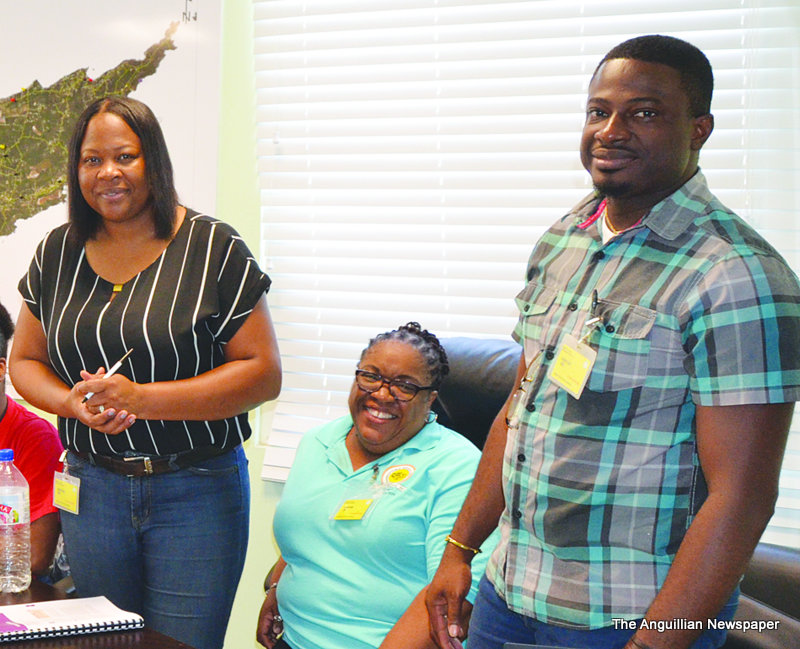The Anguilla Red Cross, in collaboration with the Ministry of Social Development and the Department of Disaster Management, last week conducted a six-day workshop of intense all-day training to enhance the skills of first responders in adequately dealing with the psycho-social aspects of tragic scenes. The sessions were held at the conference room of the airport fire hall.
The main facilitator was Mrs. Hyacinth Augustine Bradley, Community Services Planner in the Ministry of Social Development. She was assisted by Mr. Rodwell Grant, Senior Social Worker in the Child Maintenance Unit, as well as by Disaster Manager, Ms. Susan Hodge, and Ms. Jennyville Smith, Trainer and Red Cross Member. Benefiting from the training were 38 fire fighters and 7 Red Cross service volunteers who gleaned insight from such topics as Loss and Grief and Psychological First Aid.

Mrs. Bradley introduced the objectives of the sessions: “We are here in the capacity of Red Cross Volunteers, and we are trainers in community based psycho-socio support and psychological first aid. We are training a group of fire fighters and Red Cross volunteers. The purpose of these sessions is to enhance the participants’ knowledge and skills in how they should respond in addressing the emotional aspects of victims who would have been suddenly struck with some form of tragedy [be it the scene of a fire, an accident, a drowning, etc.].”
Mrs. Bradley mentioned that apart from making lecture presentations, they were also concerned with enabling the participants to be mentally prepared for what they are likely to meet at a crisis scene. This was accomplished by creating relevant scenic drama and drills of tragic incidents.

(Jenniville Smith – absent)
In asking Mr. Grant for his views on the training, he responded: “I believe this is an excellent programme that speaks to the psycho-social aspect of disaster. Oftentimes, following a tragedy, we think about the best way to get people back in their homes and getting the community settled again, but we need to remember that after a traumatic incident those affected have to be dealing with post-traumatic stress disorders.”
He made the observation that people sometimes have a hard time coping with grief and loss, and they react in peculiar ways. “So this training,” he said, “equips the participants to respond to the psycho-social aspect of trauma.”
Ms. Susan Hodge was ready to give her impressions as well. She noted: “Mental health and psycho-social support has always been something that I have advocated for — since joining the department. The psychological aspect of the trauma needs to be addressed and supported just as much as the physical and infrastructural. I have trained with PAHO in psycho-socio support, and I have also trained with UNICEF in ‘Return to Happiness’. So I am proud and happy to share from my experiences as I endeavour to train others.”
The Anguillian inquired from a few of the participants how they benefitted from the training. Fire fighter, Britney Webster said: “I am a fire fighter and I am very proud of my job which I love very much. The sessions so far have been quite informative. I have learnt a lot here, and I have developed new skills. These are skills that I am anxious to put into play while doing my job. I am looking forward for a refresher course, perhaps in the next two years, so that I can build on what I have learnt in this session.”
Fire fighter, Fortune Hilton commented: “I want to say thanks to the Red Cross for taking this time out to share their knowledge with us. As fire fighters — who are first responders — we occasionally confront tragic situations whenever we are called to respond. This training will enhance our skills and give us the required knowledge and abilities to deal with such situations when they arise. The environment is changing out there, and we need to keep abreast and ready to do our job effectively. This kind of training helps us to do that.”
Finally, Red Cross Volunteer Sharna Richardson spoke for herself as well as on behalf of her twin sister, Sharnice, who sat beside her in the sessions. She commented: “This training was a real eye-opener because at times when dealing with traumatic crises, we only focus on the physical aspects of the incident. But this session taught us how to deal with the mental and emotional facets of the crisis as well. This is important because, at times, when the physical pain of the ordeal is past, the mental memories and emotional stress still linger. So this training will help us to give support to those who suffer emotionally.”
Mrs. Bradley mentioned that part of the training focused on emotionally supporting the responders themselves, even as they go out and support the affected public. She noted that while they are taught what is expected of them, as part of their service to others, they are also provided with emotional support themselves so that they are ready to respond efficiently when they are called out to a scene of tragedy.
- Staff Reporter, James R. Harrigan







